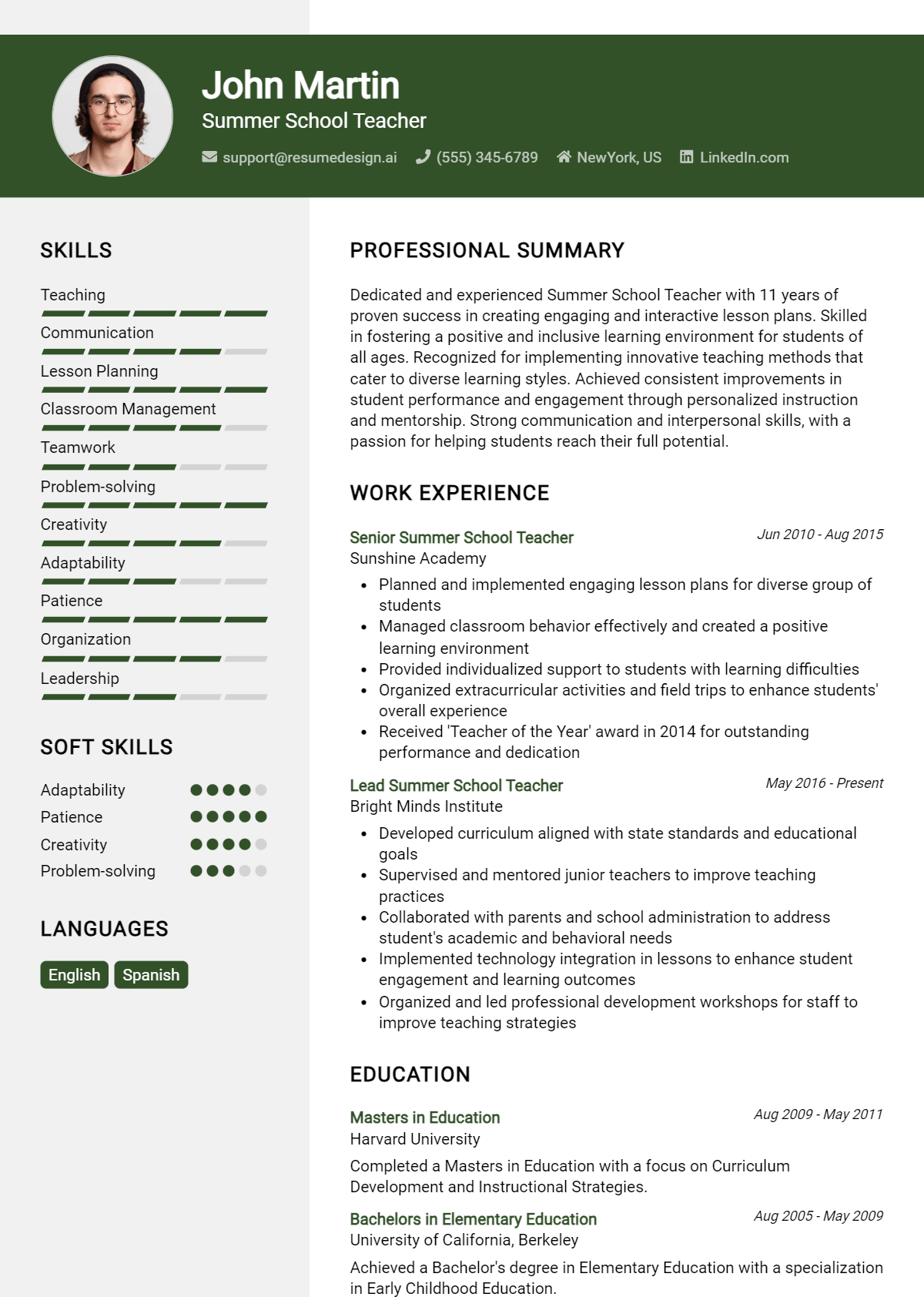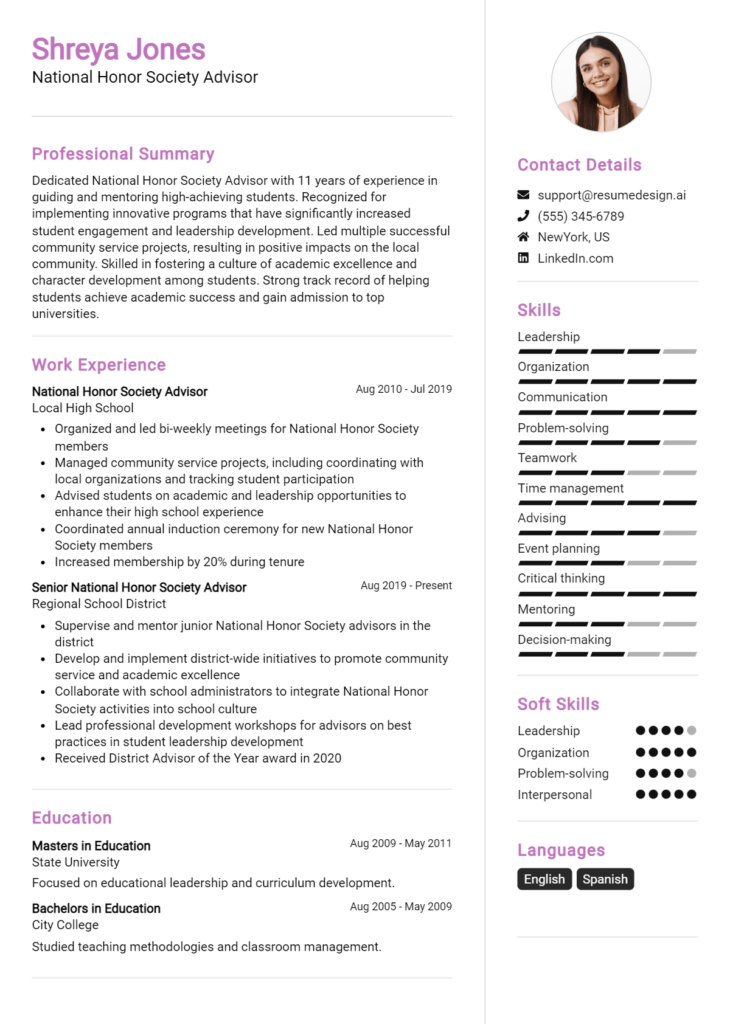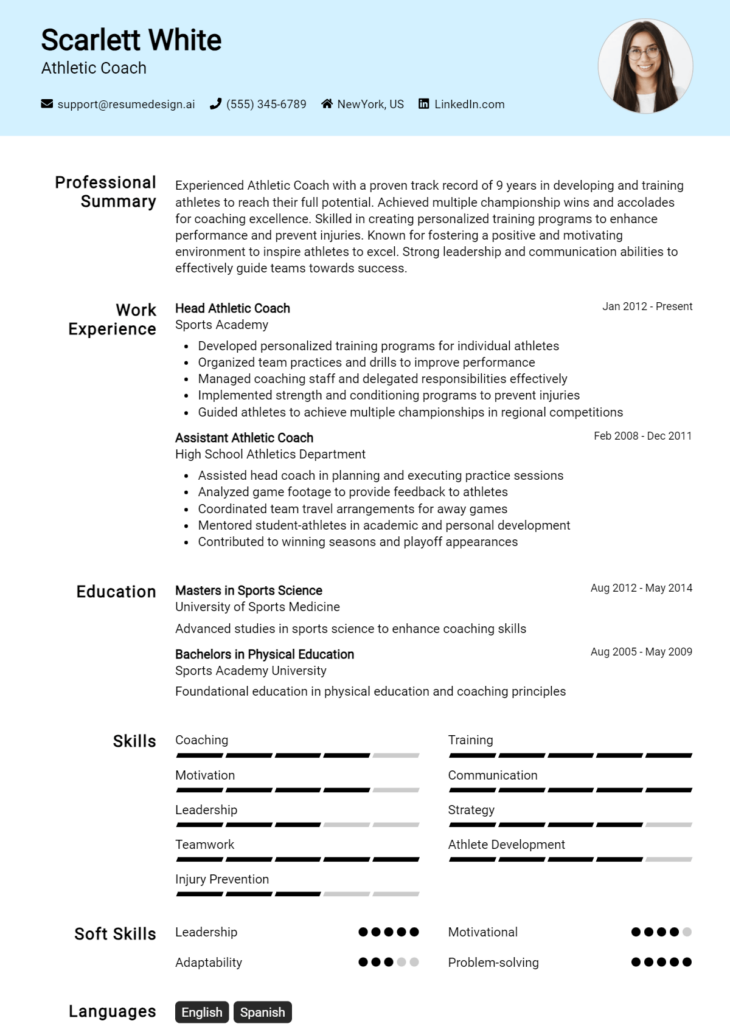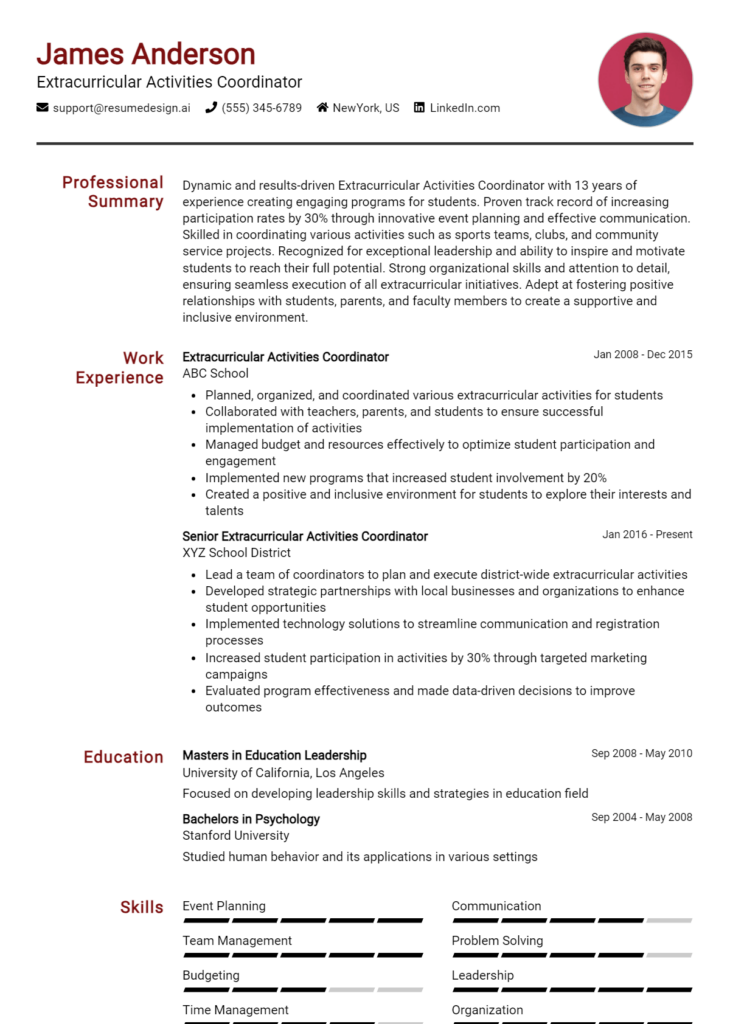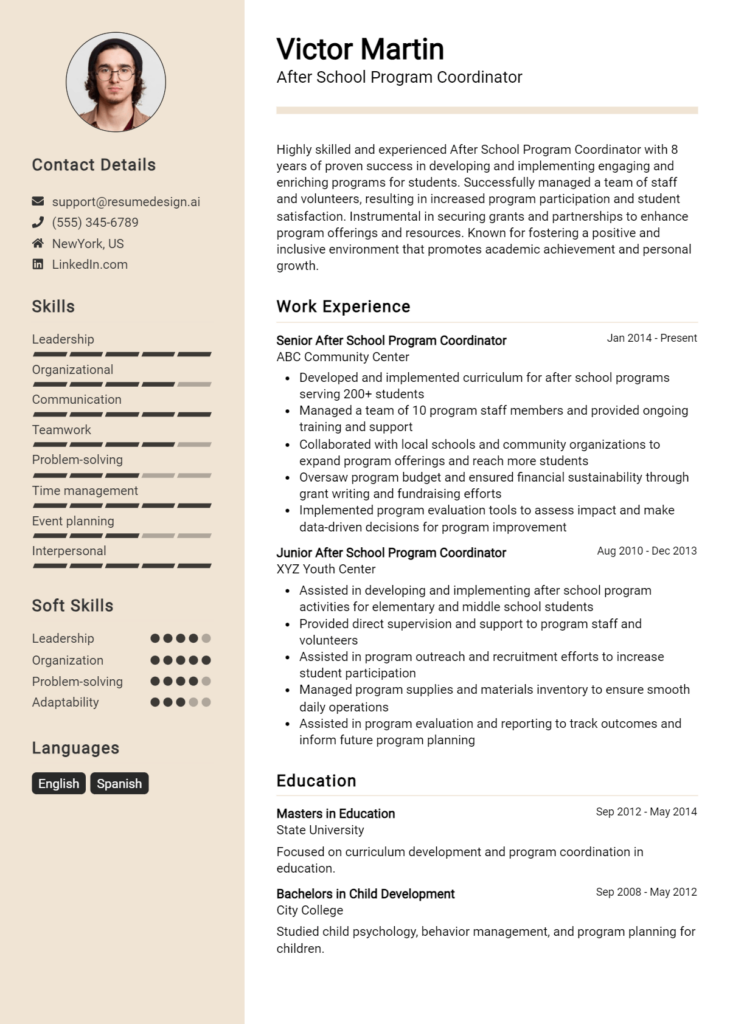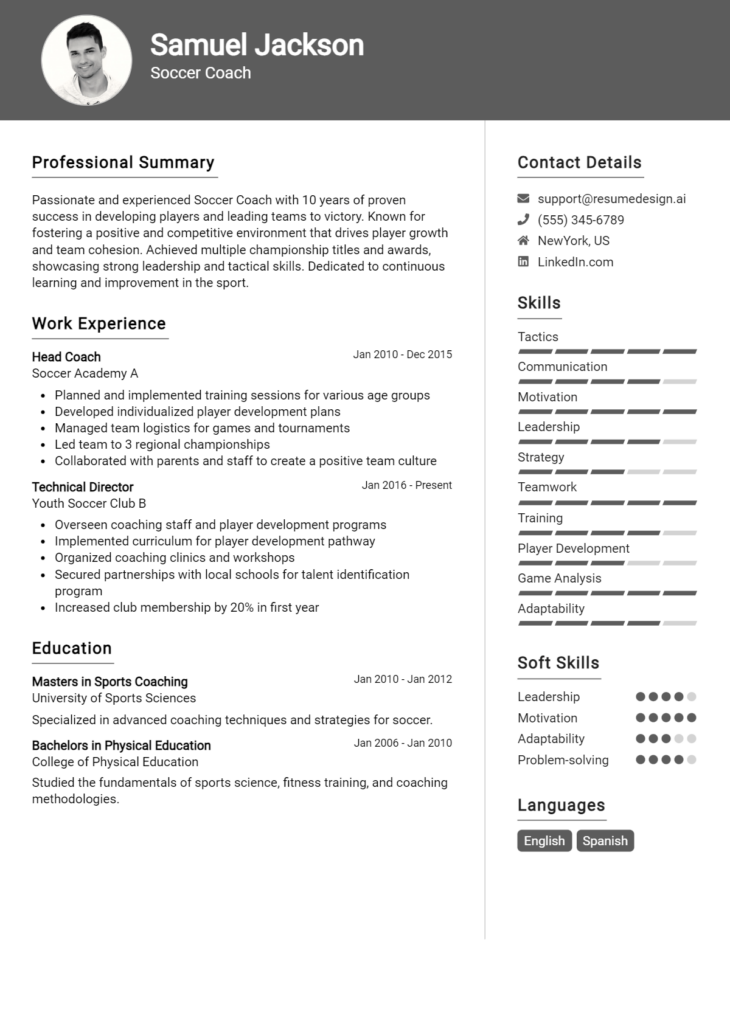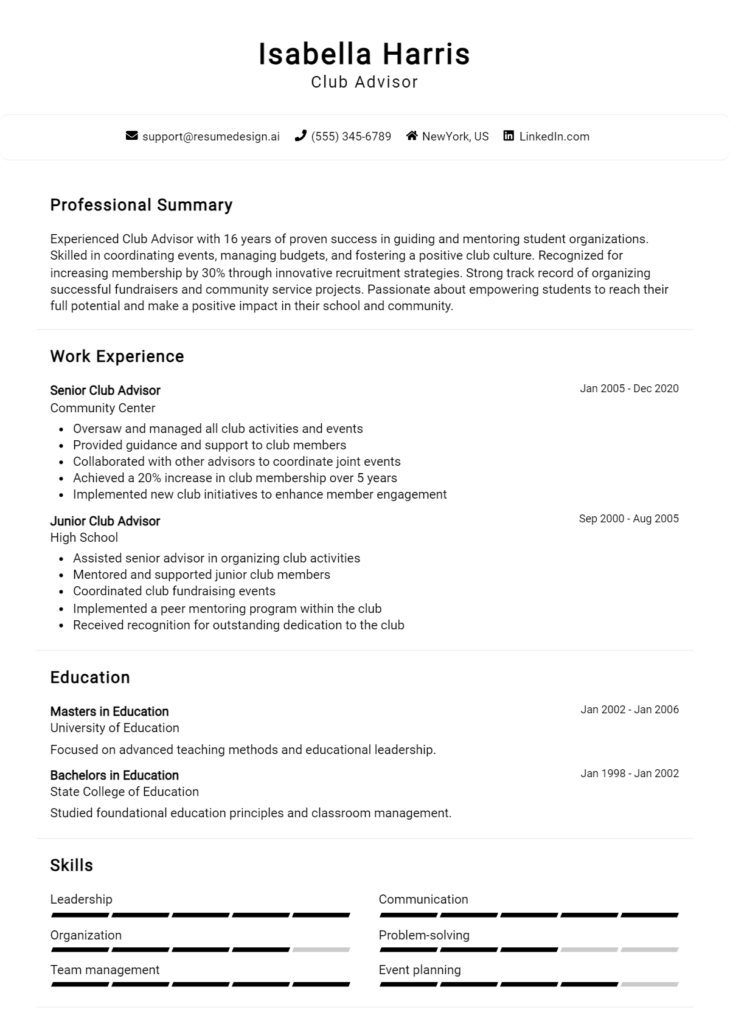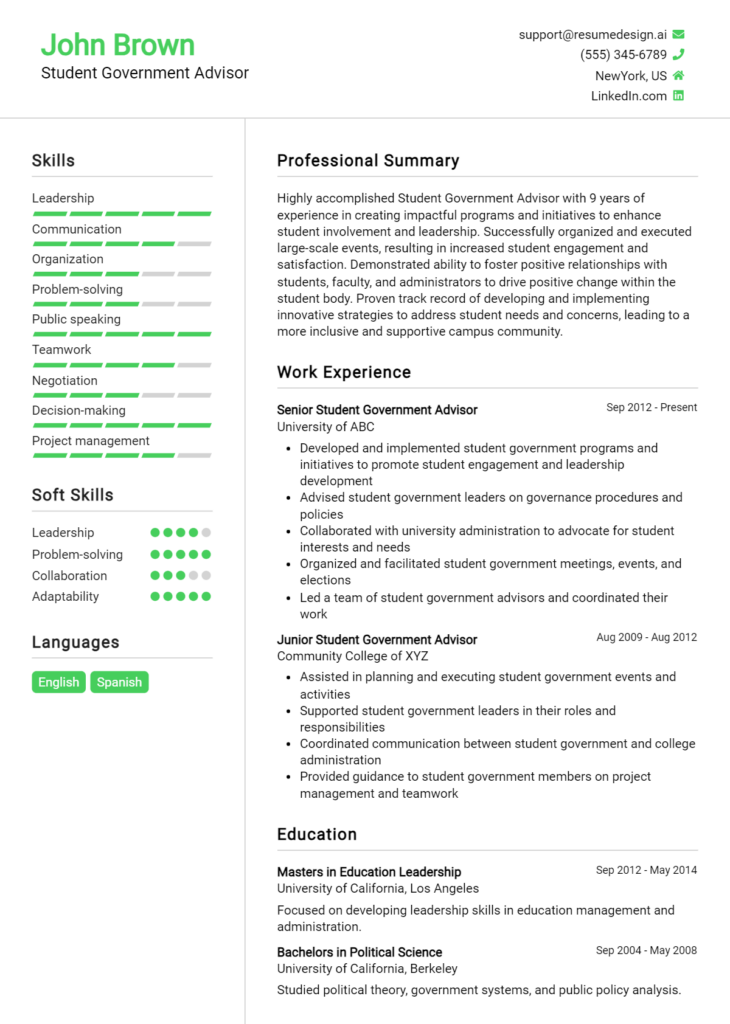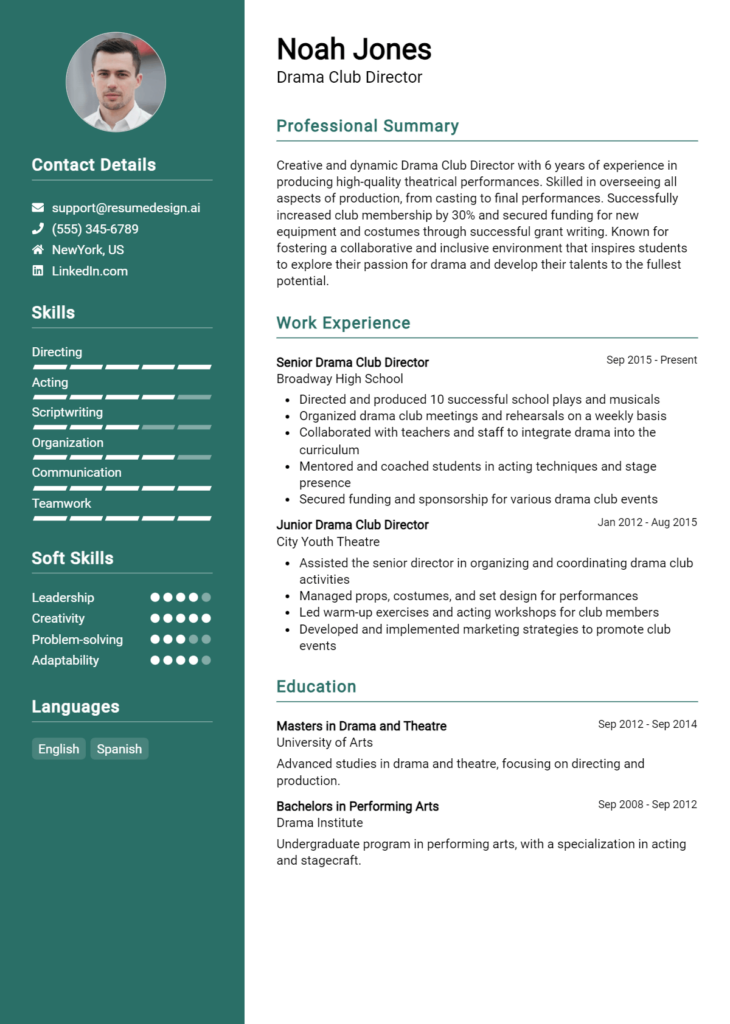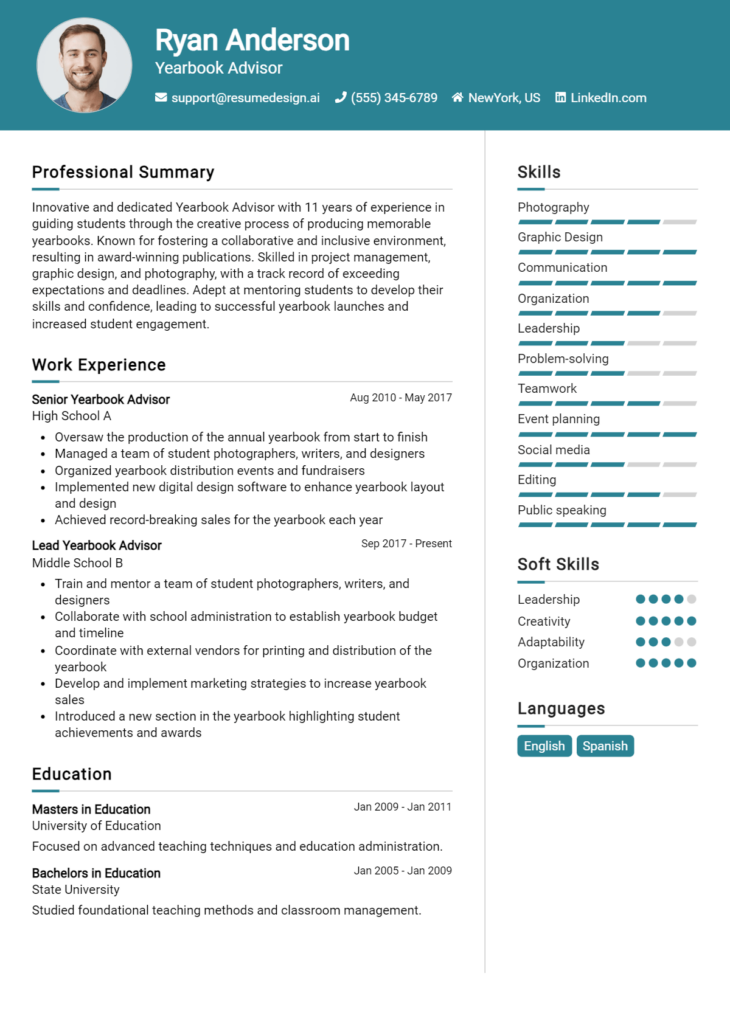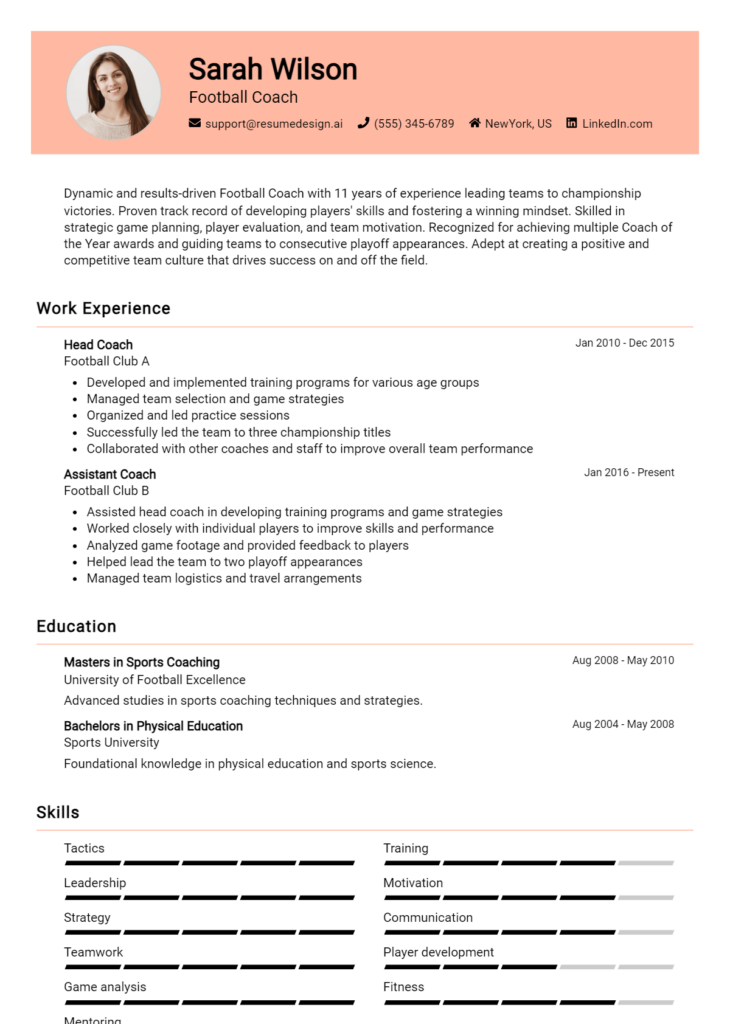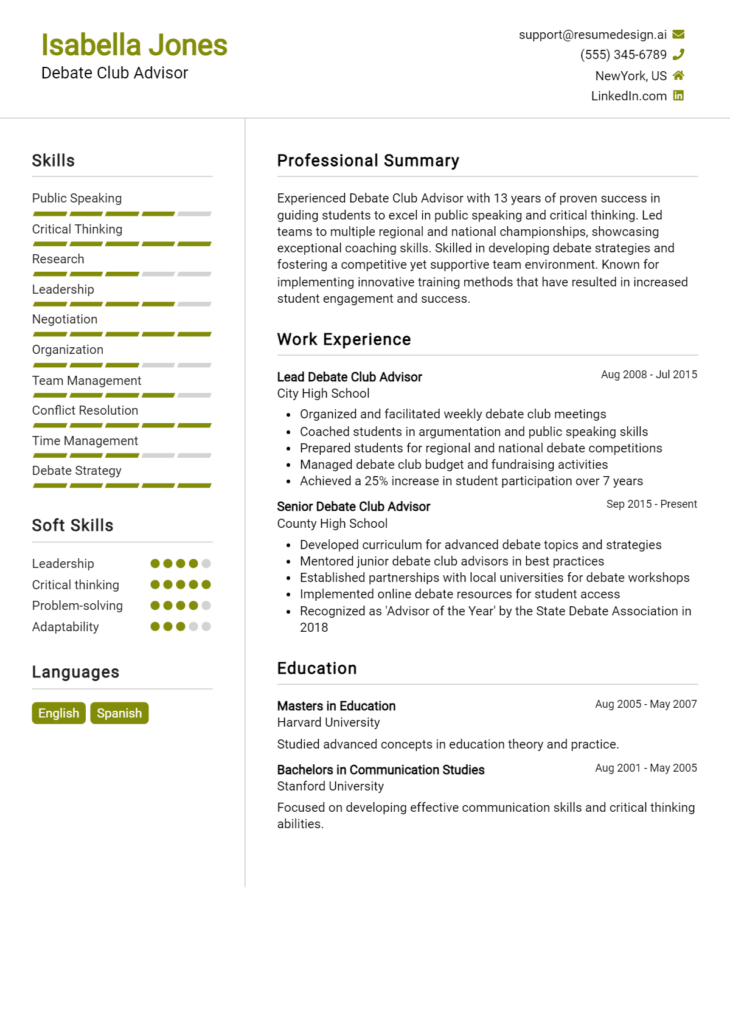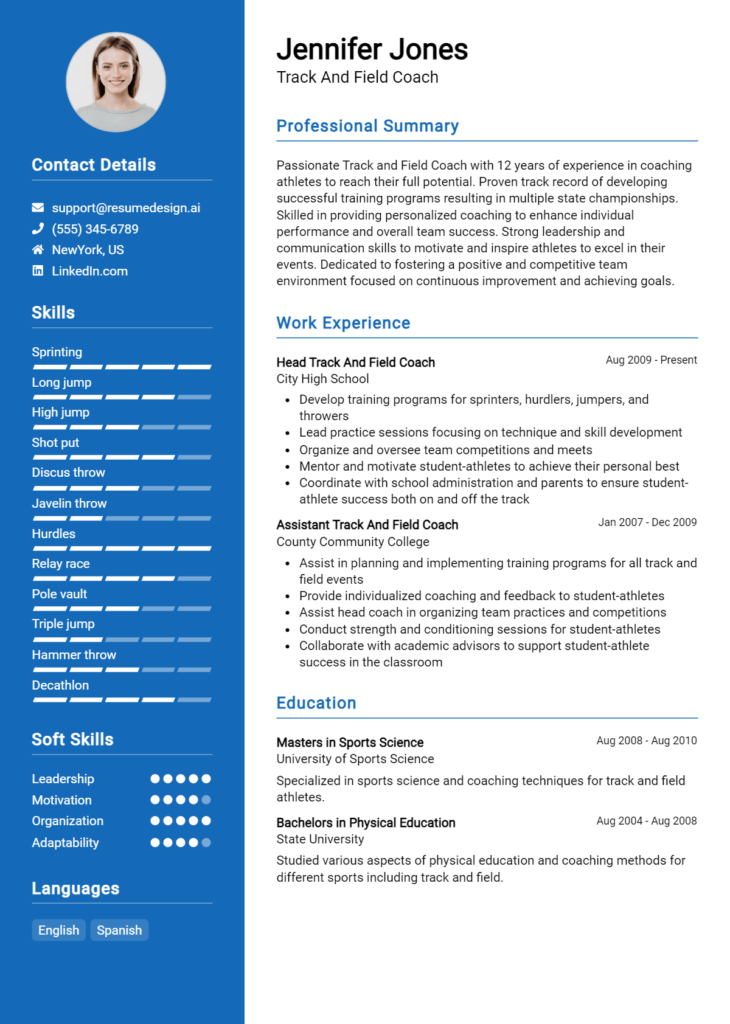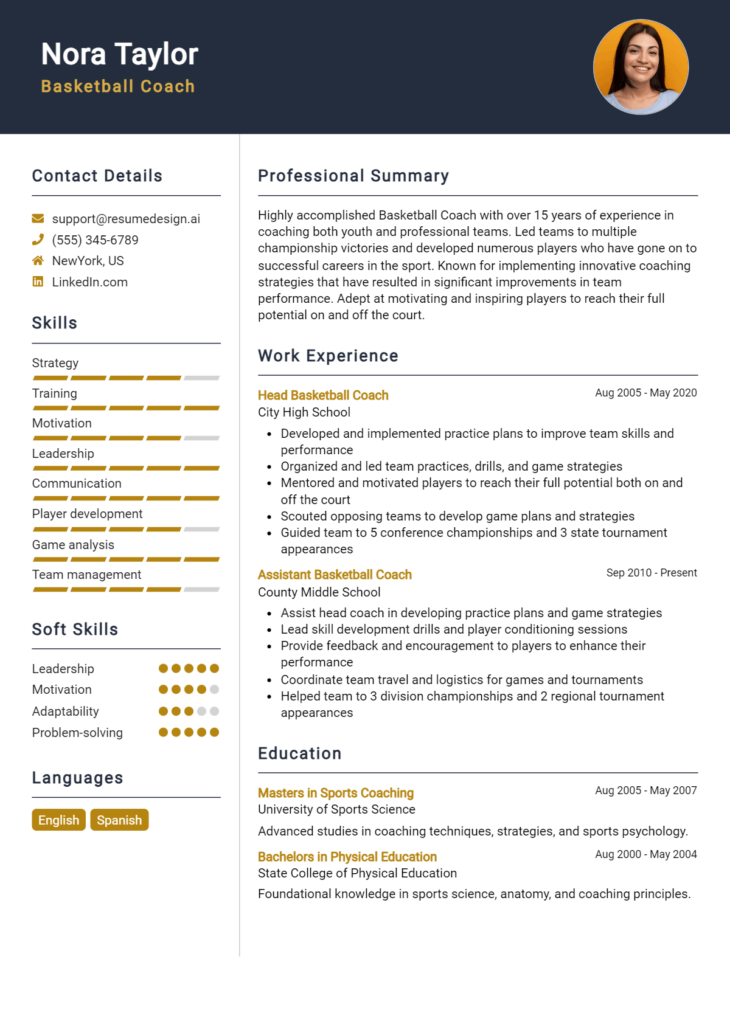Summer School Teacher Core Responsibilities
A Summer School Teacher plays a pivotal role in fostering student development during the summer months, bridging educational departments by integrating curriculum and instructional strategies. Key responsibilities include designing engaging lesson plans, assessing student progress, and providing individualized support. Essential skills encompass technical proficiency in educational tools, operational efficiency in classroom management, and strong problem-solving abilities to address diverse student needs. A well-structured resume highlighting these qualifications is crucial for demonstrating alignment with the organization’s educational goals.
Common Responsibilities Listed on Summer School Teacher Resume
- Develop and implement creative lesson plans tailored to diverse learning styles.
- Assess and evaluate student performance through various assessment methods.
- Provide individualized support and feedback to enhance student learning.
- Foster a positive classroom environment that encourages participation.
- Collaborate with colleagues to align curriculum and share best practices.
- Maintain accurate records of student attendance and progress.
- Engage parents and guardians in the learning process through regular communication.
- Adapt teaching methods based on student feedback and performance data.
- Utilize technology and educational resources to enhance learning experiences.
- Organize and supervise extracurricular activities to promote student engagement.
High-Level Resume Tips for Summer School Teacher Professionals
In today's competitive job market, a well-crafted resume is essential for Summer School Teacher professionals seeking to make a strong first impression on potential employers. Your resume serves as the initial introduction to your skills, experience, and achievements, often determining whether you will advance to the interview stage. It is critical that your resume not only highlights your qualifications but also reflects your passion for education and your ability to engage with students in a summer learning environment. This guide will provide practical and actionable resume tips specifically tailored for Summer School Teacher professionals, helping you to stand out among a pool of candidates.
Top Resume Tips for Summer School Teacher Professionals
- Tailor your resume to each job description by incorporating keywords and phrases found in the posting.
- Highlight relevant teaching experience, including summer programs, workshops, or tutoring roles.
- Quantify your achievements by including statistics, such as improved student performance or attendance rates.
- Showcase your ability to create engaging lesson plans that cater to diverse learning styles and needs.
- Emphasize any specialized training or certifications relevant to summer education, such as first aid or special education.
- Include any extracurricular activities or volunteer work that demonstrate your commitment to student development.
- Utilize a clean and professional format that is easy to read, ensuring that important information stands out.
- Incorporate testimonials or references from past supervisors or parents that speak to your teaching effectiveness.
- Make sure to list any technology skills that can enhance summer learning experiences, such as familiarity with educational software.
- Keep your resume concise and focused, ideally one page, to ensure that it retains the attention of hiring managers.
By implementing these tips, you can significantly increase your chances of landing a job as a Summer School Teacher. A targeted and polished resume not only showcases your qualifications but also reflects your dedication to fostering a positive learning environment, making you a desirable candidate for educational institutions looking to enrich their summer programs.
Why Resume Headlines & Titles are Important for Summer School Teacher
In the competitive landscape of summer school teaching positions, a resume headline or title serves as a critical first impression for hiring managers. A well-crafted headline can instantly grab attention and encapsulate the candidate's key qualifications in a succinct, impactful phrase. It acts as a powerful summary that not only highlights the individual’s strengths but also aligns closely with the specific requirements of the summer school role. By being concise and relevant, a strong resume headline sets the stage for the rest of the application, inviting further consideration from potential employers.
Best Practices for Crafting Resume Headlines for Summer School Teacher
- Keep it concise—aim for one impactful phrase.
- Make it role-specific by incorporating keywords from the job description.
- Highlight your unique strengths or experiences relevant to summer education.
- Use action-oriented language to convey energy and enthusiasm.
- Avoid vague terms; be specific about your expertise or focus area.
- Consider your audience; tailor the headline to the school or program type.
- Include certifications or special skills that set you apart.
- Update and refine your headline regularly to reflect your most relevant qualifications.
Example Resume Headlines for Summer School Teacher
Strong Resume Headlines
Dedicated Summer School Teacher with 5+ Years of Experience in Engaging Curriculum Development
Dynamic Educator Specializing in STEM Programs for At-Risk Youth
Certified Teacher Committed to Fostering a Positive Learning Environment for Diverse Learners
Weak Resume Headlines
Teacher Looking for Summer Job
Experienced Educator
The strong headlines are effective because they convey specific qualifications, demonstrate a clear understanding of the role, and highlight what makes the candidate stand out. They utilize relevant keywords and clearly communicate the applicant’s strengths. In contrast, the weak headlines fail to impress due to their vagueness and lack of detail—they do not provide hiring managers with any insight into the candidate's unique value or suitability for the summer school position. As a result, they risk being overlooked in a sea of applications.
Writing an Exceptional Summer School Teacher Resume Summary
A resume summary is a crucial element for a Summer School Teacher's application, as it serves as the first impression on hiring managers. A well-crafted summary quickly captures attention by succinctly showcasing key skills, relevant experiences, and notable accomplishments that align with the job role. It is essential for the summary to be concise yet impactful, providing a snapshot of the candidate's qualifications tailored specifically to the position they are applying for. This focused approach not only highlights the candidate's potential contributions to the summer school program but also sets the tone for the rest of the resume.
Best Practices for Writing a Summer School Teacher Resume Summary
- Quantify achievements where possible to demonstrate impact.
- Focus on skills that are directly relevant to the summer teaching role.
- Tailor the summary to reflect the specific job description and requirements.
- Use clear, concise language to convey your message effectively.
- Incorporate keywords from the job listing to pass through applicant tracking systems.
- Highlight any specialized training or certifications that enhance your qualifications.
- Showcase your ability to engage and inspire students, particularly in a summer learning environment.
- Keep the summary to 3-4 sentences to maintain clarity and brevity.
Example Summer School Teacher Resume Summaries
Strong Resume Summaries
Dedicated summer school teacher with over 5 years of experience enhancing student engagement through innovative lesson plans, resulting in a 20% increase in student participation rates. Skilled in creating inclusive learning environments that foster academic and social growth.
Enthusiastic educator specializing in STEM subjects, successfully improving student test scores by an average of 15% during summer sessions. Proven ability to develop interactive curricula that promote critical thinking and collaboration among diverse groups of learners.
Accomplished summer school teacher with a Master’s in Education and a track record of boosting student retention rates by 30% through personalized learning strategies and effective communication with parents and guardians.
Results-oriented educator with expertise in literacy instruction, having implemented a reading program that improved average reading levels by two grades in a single summer. Passionate about creating a supportive and engaging classroom atmosphere.
Weak Resume Summaries
I am a teacher looking for a summer position to help students learn. I have experience working with children and enjoy teaching.
Summer school teacher with several years of experience. I am dedicated and passionate about education but have not had many specific accomplishments.
The strong resume summaries are considered effective because they provide specific, quantifiable achievements and highlight relevant skills, showcasing the candidate's impact in previous roles. In contrast, the weak summaries lack detail, specificity, and measurable outcomes, making them generic and less compelling to hiring managers. By clearly demonstrating qualifications and successes, the strong summaries stand out, while the weak ones fail to capture attention or convey the candidate’s true potential.
Work Experience Section for Summer School Teacher Resume
The work experience section of a Summer School Teacher resume plays a critical role in demonstrating a candidate's relevant skills and expertise in educational settings. This section not only highlights technical skills such as lesson planning, curriculum development, and classroom management but also emphasizes the ability to lead and collaborate effectively with colleagues, students, and parents. By quantifying achievements and aligning experiences with industry standards, candidates can illustrate their impact on student learning and overall program success, thereby setting themselves apart in a competitive job market.
Best Practices for Summer School Teacher Work Experience
- Use action verbs to clearly convey your contributions and accomplishments.
- Quantify results wherever possible, such as improvements in student performance or engagement levels.
- Highlight specific technical skills related to curriculum design and technology integration.
- Showcase collaboration with other educators and staff to enhance the learning environment.
- Tailor your experience to align with the job description and educational standards.
- Include relevant certifications or professional development that supports your teaching abilities.
- Demonstrate adaptability by describing experiences in diverse educational settings.
- Focus on achievements that reflect your commitment to student success and academic excellence.
Example Work Experiences for Summer School Teacher
Strong Experiences
- Designed and implemented a summer enrichment program that increased student engagement by 30% through hands-on learning activities.
- Collaborated with a team of 5 educators to develop a cross-curricular project that improved critical thinking skills in 60% of participating students.
- Utilized educational technology to create interactive lessons, resulting in a 25% improvement in student assessments compared to the previous year.
- Led a workshop for fellow teachers on differentiated instruction techniques, enhancing teaching methods for over 20 faculty members.
Weak Experiences
- Taught various subjects in summer school.
- Assisted other teachers with lesson planning.
- Helped students with their homework assignments.
- Participated in staff meetings and discussions.
The examples categorized as strong experiences are considered effective because they are specific, quantifiable, and demonstrate clear outcomes resulting from the candidate's actions. They reflect a proactive approach to teaching and collaboration, showing a measurable impact on student learning and professional development. In contrast, the weak experiences lack detail and do not convey any significant achievements or contributions. They are vague and do not provide a clear understanding of the candidate's role or the impact of their work.
Education and Certifications Section for Summer School Teacher Resume
The education and certifications section is a crucial component of a Summer School Teacher resume, as it serves to showcase the candidate's academic background and professional qualifications. This section not only highlights relevant degrees but also emphasizes industry-recognized certifications and any specialized training the candidate has pursued. By providing details about relevant coursework and ongoing education, candidates can demonstrate their commitment to continuous learning and their readiness to meet the diverse needs of summer school students. A well-structured education and certifications section greatly enhances a candidate's credibility and alignment with the job role, making it a vital aspect of their application.
Best Practices for Summer School Teacher Education and Certifications
- Focus on relevant degrees, such as Education, Child Development, or a related field.
- Include industry-recognized certifications like Teaching Credential, CPR, and First Aid certifications.
- List any specialized training, such as ESL (English as a Second Language) or special education courses.
- Provide details of relevant coursework that directly relates to summer school curriculum and strategies.
- Highlight advanced degrees (Master's or Doctorate) in education or related fields to demonstrate expertise.
- Keep descriptions concise and focused on how the qualifications enhance teaching effectiveness.
- Use bullet points for clarity and ease of reading, ensuring the most relevant information stands out.
- Regularly update the section to reflect any new certifications or educational achievements.
Example Education and Certifications for Summer School Teacher
Strong Examples
- Bachelor of Arts in Education, University of California, Los Angeles (UCLA), 2020
- Certification in Teaching English as a Second Language (TESOL), 2021
- Completed coursework in Classroom Management and Differentiated Instruction, 2022
- Certified in CPR and First Aid, American Red Cross, 2023
Weak Examples
- Associate Degree in General Studies, Community College, 2015
- Certificate in Microsoft Office, 2018
- High School Diploma, 2010
- Outdated Teaching Credential (expired), 2016
The strong examples are considered effective as they align directly with the requirements of a Summer School Teacher, showcasing relevant degrees and certifications that enhance teaching capabilities. They reflect a commitment to specialized education and ongoing professional development. In contrast, the weak examples lack relevance to the teaching role, highlighting outdated or general qualifications that do not support the candidate's suitability for a summer school teaching position. Such distinctions are essential for employers seeking qualified educators who can provide a meaningful learning experience for students.
Top Skills & Keywords for Summer School Teacher Resume
As a Summer School Teacher, showcasing a well-rounded set of skills on your resume is crucial in standing out among a competitive pool of candidates. The right combination of hard and soft skills not only highlights your qualifications but also reflects your ability to create an engaging and productive learning environment for students during the summer months. Potential employers look for teachers who can adapt to various teaching scenarios, manage diverse classroom dynamics, and effectively communicate with students and parents alike. Understanding the essential skills for this role can significantly enhance your resume and increase your chances of securing a position. For more insights on how to effectively present your skills and work experience, read on.
Top Hard & Soft Skills for Summer School Teacher
Soft Skills
- Effective Communication
- Patience and Empathy
- Adaptability
- Conflict Resolution
- Team Collaboration
- Creativity in Teaching
- Enthusiasm for Learning
- Time Management
- Problem-Solving
- Leadership Skills
- Cultural Sensitivity
- Motivational Skills
- Active Listening
- Flexibility
Hard Skills
- Lesson Planning and Curriculum Development
- Classroom Management Techniques
- Assessment and Evaluation Methods
- Proficiency in Educational Technology
- Knowledge of Subject Matter (e.g., Math, Science, English)
- Understanding of Child Development
- Special Education Strategies
- Data Analysis for Student Performance
- First Aid and CPR Certification
- Ability to Integrate STEAM Activities
- Familiarity with Educational Standards and Guidelines
- Online Teaching Tools and Platforms
- Knowledge of Learning Management Systems (LMS)
- Experience with Classroom Software (e.g., Google Classroom)
Stand Out with a Winning Summer School Teacher Cover Letter
Dear [Hiring Manager's Name],
I am excited to apply for the Summer School Teacher position at [School/Organization Name] as advertised on [where you found the job listing]. With a strong background in education and a passion for fostering a positive learning environment, I am confident in my ability to engage and motivate students during the summer session. My experience working with diverse groups of learners, along with my commitment to helping each student reach their full potential, aligns perfectly with the goals of your program.
In my previous role as a [Your Previous Position] at [Your Previous School/Organization], I successfully developed and implemented engaging lesson plans that catered to varying learning styles. I utilized hands-on activities, technology, and collaborative projects to create an interactive classroom atmosphere that encouraged participation and enthusiasm for learning. My approach not only helped students grasp fundamental concepts but also instilled a sense of confidence and curiosity that inspired them to explore new ideas. I am eager to bring this same energy and creativity to the summer school program at [School/Organization Name].
Furthermore, I understand the unique challenges that summer school presents, including the need for accelerated learning and the importance of building strong relationships with students in a shorter time frame. I prioritize creating a welcoming and inclusive classroom where students feel safe to express themselves and take intellectual risks. By establishing meaningful connections, I can effectively support students' academic growth while making their summer experience enjoyable and memorable.
I am thrilled about the opportunity to contribute to [School/Organization Name] as a Summer School Teacher and to help students thrive during their summer learning journey. Thank you for considering my application. I look forward to the opportunity to discuss how my skills and experiences align with the needs of your program.
Sincerely,
[Your Name]
[Your Contact Information]
Common Mistakes to Avoid in a Summer School Teacher Resume
When crafting a resume for a Summer School Teacher position, it's essential to present a polished and professional document that highlights your qualifications and teaching experience. However, many candidates make common mistakes that can diminish their chances of landing an interview. By avoiding these pitfalls, you can create a compelling resume that effectively showcases your skills and dedication to education.
Neglecting to Tailor the Resume: Failing to customize your resume for the specific summer school position can make it seem generic and uninspiring. Tailoring your resume to match the job description shows your genuine interest and relevant qualifications.
Using Vague Language: Phrases like "responsible for" or "helped with" do not convey your direct impact. Instead, use action verbs and specific examples to demonstrate your contributions and successes in previous roles.
Overloading with Irrelevant Experience: Including every job you've ever held can dilute the focus of your resume. Stick to experiences relevant to teaching or working with children, emphasizing skills that apply to a summer school setting.
Ignoring Formatting and Readability: A cluttered or poorly formatted resume can be difficult to read. Use consistent fonts, bullet points, and clear headings to enhance readability and ensure that key information stands out.
Omitting Quantifiable Achievements: Failing to include metrics or specific outcomes from your teaching experiences can leave your accomplishments unclear. Use numbers to highlight improvements, such as "increased student engagement by 30%."
Neglecting Professional Development: Omitting any professional development or training related to education can make your resume seem incomplete. Include workshops, certifications, or courses that demonstrate your commitment to growth as an educator.
Forgetting to Proofread: Spelling and grammatical errors can create a negative impression. Always proofread your resume multiple times and consider having someone else review it to catch any mistakes.
Lacking a Strong Objective or Summary: A weak or missing objective statement can fail to capture the attention of hiring managers. A strong opening statement should clearly articulate your goals and what you bring to the summer school program.
Conclusion
As a Summer School Teacher, you play a pivotal role in shaping young minds during the critical months of summer. Your responsibilities may include designing engaging curriculum, fostering a positive learning environment, and addressing the diverse needs of students. Effective communication, adaptability, and creativity are essential skills that can significantly enhance the learning experience. Additionally, collaborating with fellow educators and engaging with parents can further support student growth and achievement.
In conclusion, as you prepare for your next summer teaching role, it's essential to ensure that your resume reflects your unique qualifications and experiences effectively. Take the time to review your Summer School Teacher Resume and make any necessary updates to showcase your skills and accomplishments. To assist you in this process, consider utilizing available resources such as resume templates, a resume builder, resume examples, and cover letter templates. These tools can help you craft a standout resume that captures the attention of hiring committees and positions you for success in your next summer teaching opportunity.

